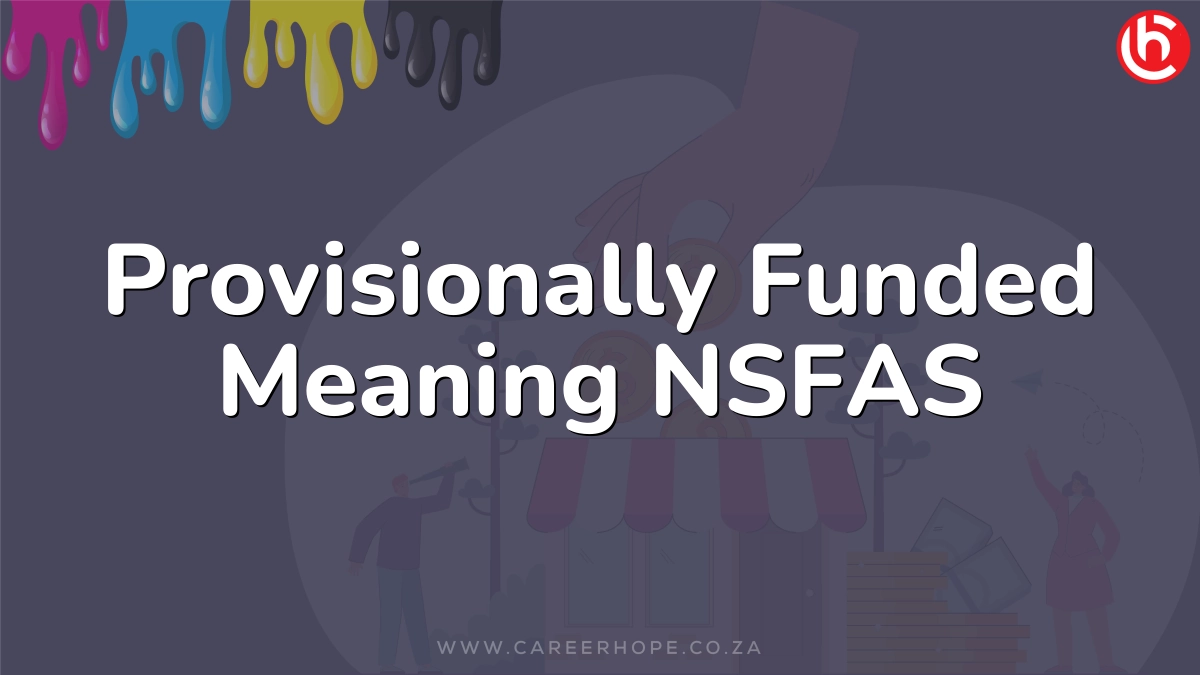Many aspiring students find themselves in a financial quandary when it comes to pursuing their educational dreams. However, the National Students Financial Aid Scheme (NSFAS) has been a beacon of hope, providing provisional funding to eligible candidates. If your NSFAS status shows “Provisionally Funded,” it means your application has been approved, and you’ve been granted a bursary – a significant step towards realizing your academic aspirations.
Contents
What Does “Provisionally Funded” Mean for NSFAS Applicants?
When you see the “Provisionally Funded” status on your NSFAS application, it signifies that your funds have been approved, but NSFAS is waiting for your institute to submit your registration details. The National Student Financial Aid Scheme defines specific criteria and courses that are eligible for funding, including those offered by public institutes. Once your enrolled TVET college or university provides NSFAS with your registration data, including course details, your funding will be verified and released.
Eligibility Criteria for NSFAS Provisional Funding
To increase your chances of receiving NSFAS provisional funds, it’s essential to meet the following criteria:
- South African citizenship
- Combined household income below R350,000 (or below R600,000 for disabled applicants)
- Grant recipient status
- Enrollment or plan to enroll in a public university or TVET college for an undergraduate or diploma program
Steps to Confirm Your Provisional Funding
If you’ve been provisionally funded, congratulations! However, there are a few steps you need to take to confirm your funding:
- Verify all required documents, such as proof of income or identity documents.
- Provide any additional information requested by NSFAS.
- Regularly check your funding status to stay up-to-date.
- Maintain your academic record to remain eligible for funding.
Tips for Successful NSFAS Provisional Funding
To increase your chances of receiving NSFAS provisional funds, follow these helpful tips:
- Submit your application well before the deadline, and avoid last-minute submissions.
- Provide complete and accurate information in your application.
- Promptly respond to requests for additional documents.
- Ensure your contact information is up-to-date to receive notifications.
- Maintain your academic performance to remain eligible for funding.
People Also Ask
How long does it take for NSFAS to process provisional funding?
The processing time for NSFAS provisional funding can vary depending on the volume of applications and the completeness of the information provided. It’s advisable to apply early and respond promptly to any requests for additional documents to expedite the process.
Can I appeal if my NSFAS application is rejected?
Yes, you have the right to appeal if your NSFAS application is rejected. NSFAS provides an appeals process where you can submit additional documentation or clarify any misunderstandings that may have led to the rejection.
What expenses does NSFAS provisional funding cover?
NSFAS provisional funding typically covers tuition fees, accommodation, meals, learning materials, and transportation costs. However, the specific allowances may vary depending on your institution and the program you are enrolled in.
Can I receive NSFAS funding if I’m a part-time student?
Unfortunately, NSFAS funding is generally not available for part-time studies. The scheme primarily supports full-time undergraduate and diploma students enrolled at public institutions.
What happens if I fail to maintain my academic performance while receiving NSFAS funding?
Maintaining satisfactory academic performance is crucial for continuing to receive NSFAS funding. If you fail to meet the required academic standards, your funding may be suspended or terminated. It’s essential to prioritize your studies and seek assistance if you’re struggling academically.
The National Student Financial Aid Scheme’s provisional funding opens doors to higher education for countless students who might otherwise be unable to pursue their dreams. By understanding the process, meeting the eligibility criteria, and following the tips provided, you can increase your chances of securing this invaluable financial support. Embrace this opportunity and pave the way for a brighter future through education.

